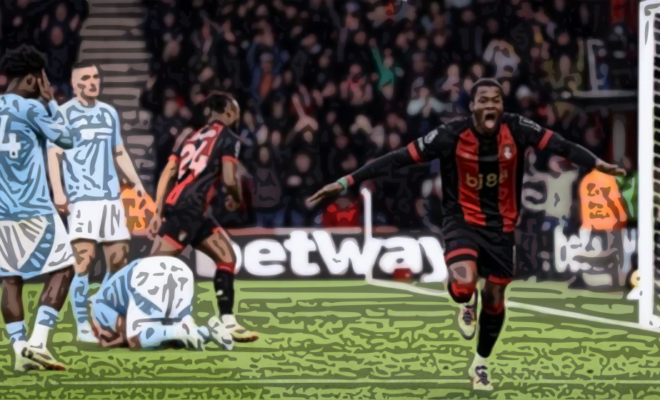A Study in Striker Effectiveness – Havertz’s Struggles Compared to the Clinical Prowess of Salah, Gakpo, and Ouattara

In the relentless pursuit of goals, football often boils down to the efficiency of the players tasked with finding the back of the net. This analysis will delve into the contrasting fortunes of forwards, specifically examining the missed opportunities of Arsenal’s Kai Havertz and comparing them with the clinical finishing of Liverpool’s Mohamed Salah and Cody Gakpo, as well as Bournemouth’s Dango Ouattara. By exploring their recent performances, we can gain insights into what separates the good from the great in the final third of the pitch, and how Arsenal’s attacking players might improve.
Havertz’s Headaches: A Story of Missed Opportunities at Wolverhampton
Kai Havertz’s recent performance against Wolverhampton was a microcosm of his challenges in front of goal. While his movement and positioning were often commendable, his inability to convert clear-cut chances left Arsenal frustrated.
- A Trio of Headed Chances: Havertz was presented with three excellent headed opportunities during the match, all of which he failed to convert.
- Missed Opportunities: One header went just past the post, while another was brilliantly saved by the Wolves keeper, Jose Sa, with his legs. A further header from a free kick was directed just over the bar.
- Overall Effectiveness: These misses highlighted a broader trend of inconsistency in Havertz’s finishing. Despite finding himself in promising positions, his failure to capitalize underscored the need for improvement.
- The Need for Clinical Finishing: Havertz’s performance illustrated the fine margins in football, where even the slightest lack of precision can make the difference between victory and disappointment.
- Good Delivery: It is important to note that Havertz’s headed chances came from well-weighted crosses from Leandro Trossard. This indicates that, while Havertz’s finishing was lacking, the service he received from his teammates was of high quality.
Havertz’s struggles against Wolves highlight the importance of taking the chances that come a striker’s way. While his work rate and movement may be commendable, his inability to convert clear goal scoring opportunities ultimately leaves his team wanting.
DuckyLuck Casino offers an exciting platform for gaming enthusiasts, providing a vast selection of casino games, from slots to table games, all accessible at your fingertips. One of the first steps to enjoying these thrilling games is the DuckyLuck Casino Login. This straightforward process allows players to access their accounts securely and start gaming in no time.
To log in, simply visit the DuckyLuck website and enter your credentials. If you’re new to the platform, registration is quick and easy, allowing you to create an account in just a few minutes. Once registered, your DuckyLuck Casino login will provide you with full access to your profile, gaming history, and exclusive promotions tailored just for you.
For convenience, you can visit this link for quick access to the login page: https://duckylucklogin.com/. Ensuring your account credentials are secure is essential, so always remember to log out after gaming and update your password periodically.
With user-friendly navigation and top-notch customer support, DuckyLuck Casino promises a seamless gaming experience for all levels of players. Enjoy your adventure in the captivating world of online casinos!
The Ruthless Reds: Salah and Gakpo’s Clinical Conversion Against Ipswich
In stark contrast to Havertz’s experience, Liverpool’s Mohamed Salah and Cody Gakpo provided a clinic in finishing against Ipswich. Their ability to convert chances with ruthless efficiency was central to their team’s victory.
- Salah’s Precision: Mohamed Salah’s goal was a perfect example of his clinical finishing ability. He expertly controlled a cross from Gakpo, and dispatched a rising shot into the roof of the net.
- Gakpo’s Finishing Prowess: Cody Gakpo demonstrated his prowess in front of goal. His first goal was a close range finish after the goalkeeper saved a shot by Szoboszlai, while his second goal was a header from a precise cross from Trent Alexander-Arnold.
- Efficient Chance Conversion: Salah and Gakpo’s goals were not the result of luck; they were the result of excellent positioning, technique, and a ruthless desire to score.
- Impact on the Game: The clinical finishing of Salah and Gakpo allowed Liverpool to dominate the match against Ipswich, securing a comfortable win.
- Alexander-Arnold’s Delivery: Alexander-Arnold’s accurate crosses created a number of chances for Gakpo, highlighting the importance of good delivery for clinical finishing.
Salah and Gakpo’s display against Ipswich is a lesson in the importance of ruthless efficiency in the final third. Both were able to convert goal-scoring opportunities, providing their team with a comfortable victory.
Ouattara’s Onslaught: A Hat-Trick of Clinical Finishing Against Nottingham Forest
Bournemouth’s Dango Ouattara also demonstrated clinical finishing against Nottingham Forest, scoring a hat-trick that included two headed goals and a goal from close range.
- A Hat-Trick of Clinical Finishes: Ouattara’s hat trick included a looped header over the goalkeeper, a close range finish after a parried shot from a teammate, and another header from a cross.
- Capitalizing on Chances: Ouattara’s finishing showed the importance of being alert and taking the chances that come his way.
- Team Support: Ouattara was supported by two assists from Tyler Adams, and this highlights the importance of good service from midfield.
- Impact on the Game: Ouattara’s hat-trick was key to Bournemouth’s dominant 5-0 victory over Nottingham Forest.
Ouattara’s performance demonstrates the impact that clinical finishing can have on the outcome of a match. His ability to convert opportunities was crucial to his team’s dominant victory.
Comparing Styles: Efficiency vs. Opportunity
While Havertz was left frustrated by his missed chances, Salah, Gakpo, and Ouattara were ruthless in capitalizing on theirs. This raises important questions about what makes a clinical finisher.
- Composure: Clinical finishers often possess a sense of calm in front of goal, allowing them to make the right decision at the crucial moment.
- Precision: The ability to place the ball accurately is a key attribute, allowing players to find the corners of the goal or beat the goalkeeper with a well-timed shot.
- Ruthlessness: Clinical finishers are often described as ‘ruthless’ – they have a relentless desire to score and rarely miss the target when presented with an opportunity.
- Movement and Positioning: Clinical finishers are able to make intelligent runs, and to position themselves in the right place at the right time, to capitalize on opportunities.
- Team Support: Delivery from supporting players is critical, as Gakpo’s and Ouattara’s goals demonstrate.
The comparison between these players underlines that the ability to find the back of the net is not just about individual talent, but also the supporting structures around them.
Lessons for Arsenal: The Path to Sharper Finishing
Arsenal, with their own ambitions for success, have much to gain from examining the contrasting fortunes of Havertz, Salah, Gakpo, and Ouattara. Improving their finishing can significantly enhance their ability to turn promising performances into victories.
- Havertz’s Development: Kai Havertz’s performance demonstrates a clear need for improvement in his finishing. His movement and positioning are good, but he needs to develop a more clinical approach in the final third.
- Practice and Technique: Arsenal’s forwards could benefit from focused practice on finishing, working to improve their composure, precision, and technique in front of goal.
- Player Support: Arsenal needs to continue to develop its attacking play, ensuring that players are positioned to receive passes in dangerous areas, and that they are able to support each other in attack.
- Creating More Chances: Arsenal should be focusing on making more chances for their forwards, so that they are presented with more opportunities to score.
- Mental Toughness: Arsenal’s forwards may benefit from working on their mental approach to goal scoring situations. Confidence, determination, and a strong mentality can often be the difference between a missed opportunity and a well-taken goal.
By focusing on these areas, Arsenal can enhance their cutting edge in the final third and turn more chances into goals.
The Importance of Player Support and Delivery
The analysis of these matches also highlights the critical importance of player support and delivery.
- Gakpo and Alexander-Arnold: The link up play between Gakpo and Alexander-Arnold for Gakpo’s headed goal highlights how crucial it is for midfielders and defenders to provide good service to forwards.
- Havertz and Trossard: Trossard’s well weighted crosses were a key factor in Havertz’s headed opportunities. Even though he did not score from these chances, the service he received highlights the importance of good delivery.
- Ouattara and Adams: Tyler Adam’s two assists for Ouattara demonstrate the importance of midfielders supporting their team’s attacking players.
The analysis demonstrates that clinical finishing is not solely an individual skill, but a product of team coordination.
The Road Ahead: Sharpening the Arsenal Attack
The contrasting fortunes of Havertz, Salah, Gakpo, and Ouattara provide a clear illustration of what it takes to be a clinical goal scorer. While Havertz needs to become more decisive in front of goal, Salah, Gakpo, and Ouattara provide the blueprint for consistent goal scoring success. By learning from the examples of these clinical finishers, Arsenal can begin to bridge the gap and develop a more potent attacking threat.
The path to a sharper attacking unit is not an easy one, but by focusing on these areas, Arsenal can lay the foundation for long-term success and a greater chance of challenging for trophies in the future.


